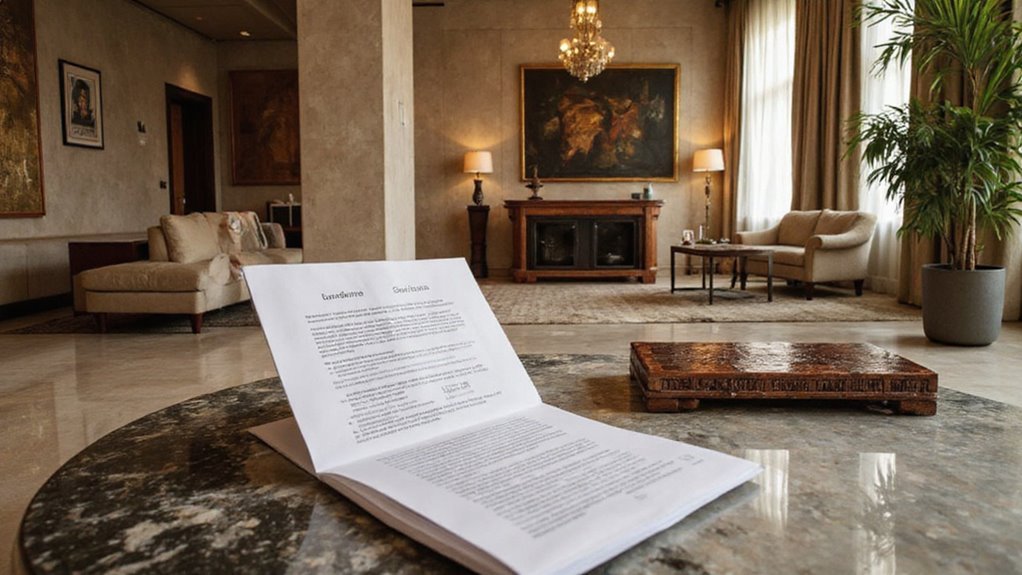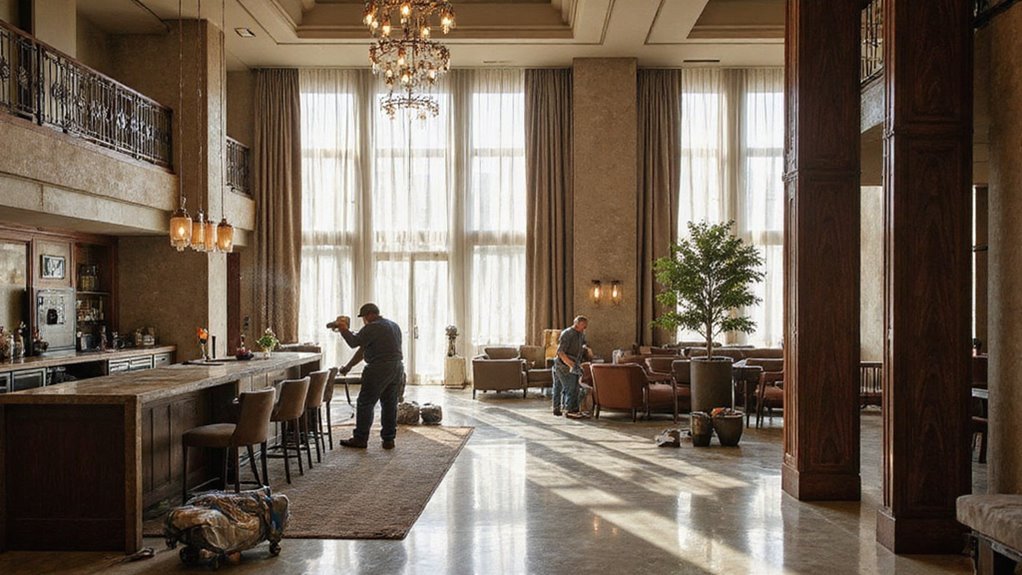You can protect your personal assets while funding mandatory PIP renovations through a non-recourse hotel bridge loanShort-term financing used to bridge the gap until permanent, which shields you from personal liability if the property underperforms. These loans prioritize your property’s value and execution plan rather than your net worth, giving you quick capital for meeting brand standards without risking your savings. Sure, you’ll pay higher interest rates than recourse loans, but that safety net’s worth the effort. The real trick? Understanding which carve-outs might still expose you and finding lenders who actually know hospitality.
Key Takeaways
- Non-recourse hotel bridge loans protect personal assets while funding mandatory PIP renovations required by major hotel brands.
- Qualifying typically requires credit scores above 700, hospitality experience, and substantial liquid reserves demonstrating financial stability.
- Non-recourse loans carry 1-2% higher rates than recourse options but shield personal savings from property defaults.
- Carve-outs for fraud, misrepresentation, and environmental violations can trigger personal liability despite non-recourse loan structures.
- Specialized hospitality lenders and alternative debt funds provide faster approval and flexible terms for PIP bridge financingInterim financing used to bridge a gap until a specific futu needs.
Understanding Non-Recourse Hotel Bridge Loans

Most hotel owners don’t realize they’ve got options when regarding personal liability—and that’s a problem. A non-recourse hotel bridge loanShort-term financing used to bridge the gap until permanent shields you from personal guaranteeA legal promise by an individual to repay business debt usin obligations, meaning lenders can’t chase your personal assets if the deal goes south. Here’s the innovation: you’re protecting your wealth while funding critical PIP renovations that brands like Marriott and Hilton demand.
With a traditional bridge loanShort-term financing used to bridge the gap until permanent for hotel financing, you’re personally in charge. Non-recourse changes everything. You’re betting the property itself, not your life savings. This structure’s especially powerful during PIP projects where timelines stretch and risks spike. The lender focuses on the asset’s value and your execution plan, not your net worth. It’s speed with a safety net—exactly what you need when modernizing aging inventory before they become liabilities.
Why Hotels Need PIP Renovations and Financing
Non-recourse loans protect your personal assets, but here’s what they don’t protect: your hotel itself. Major brands like Hilton and Marriott demand Property Improvement Plans (PIPs)—mandatory renovations that keep your property competitive and your flag agreement alive. Without funding these upgrades, you’re facing obsolescence, declining occupancy, and eventual brand termination.
| Challenge | Impact | Bridge LoanShort-term financing used to bridge the gap until permanent Solution |
|---|---|---|
| Aging Systems | Higher operating costs | Rapid capital allocation |
| Outdated Aesthetics | Lower guest demand | Swift modernization |
| Brand Compliance | License revocation | Immediate PIP funding |
| Deferred Maintenance | Safety liability | Quick renovation access |
| Market Competitiveness | Revenue loss | Speed-to-execution advantage |
Bridge loans provide access to the capital you need now, changing aging assets into revenue-generating machines before deterioration becomes irreversible.
How Non-Recourse Bridge Loans Protect Your Personal Assets
When you take out a non-recourse bridge loanShort-term financing used to bridge the gap until permanent, you’re fundamentally drawing a legal line between your personal bank account and the hotel debt—meaning if things go sideways, lenders can’t come after your house, your car, or your savings. That’s powerful protection, but here’s the catch: most bridge loans have recourse carve-outs, which are essentially escape hatches that let lenders chase you personally if you breach certain conditions like misusing funds or letting the property fall apart. Understanding which liabilities stay with the asset and which ones follow you home is the difference between a smart financial move and a nightmare you didn’t see coming.
Limited Liability Protection
The fear that one bad deal could wipe out their entire personal fortune keeps savvy investors awake at night. That’s where non-recourse bridge loans shine—they’re your financial firewall.
With non-recourse financing, you’re not personally liable if the deal tanks. The lender’s only remedy is the property itself, not your personal assets. Here’s how protection breaks down:
| Scenario | Recourse Loan | Non-Recourse Loan |
|---|---|---|
| Property Defaults | Lender sues you personally | Lender takes the property |
| Personal Assets | Vulnerable | Protected |
| Risk Level | High | Lower |
This structure lets you take calculated risks without gambling your house, retirement accounts, or savings. You’re innovating strategically—not recklessly. When you’re protected, you can focus entirely upon executing the PIP renovation and maximizing your return.
Personal Asset Safeguarding
Because you’re wagering your reputation and your capital in a hotel renovation, you need a financial structure that doesn’t stake your house, your retirement account, and your kids’ college fund at the same time. Non-recourse bridge loans do exactly that—they shield your personal assets from the lender’s claims if the deal doesn’t pan out as anticipated.
Here’s what you’re safeguarding:
- Your primary residence remains yours, regardless of the hotel’s performance
- Retirement savings stay untouched and growing
- Personal bank accounts remain off-limits to lenders
- Investment portfolios continue their own path
This separation means you’re not personally liable if the PIP renovation hits snags or occupancy dips. You’ve got breathing room to execute your vision without lying awake at night pondering if one bad quarter could wipe out everything you’ve constructed.
Recourse Carve-Out Exceptions
While non-recourse bridge loans shield your personal assets from most claims, there’s a critical catch you need to understand: lenders don’t actually let you off the hook completely. They carve out specific exceptions where you’re personally liable—and these matter. Common carve-outs include fraud, misrepresentation, environmental violations, and failure to maintain insurance. You’re also under the hook if you personally guarantee debt or misuse funds intended for renovations. Think about it like that: you’re protected unless you break the rules. The smartest move? Negotiate which carve-outs apply before signing. Ask your lender exactly what triggers personal liability. Get that in writing. That way, you know precisely where your shield ends and your risk begins—no surprises when closing time arrives.
Qualifying for Non-Recourse Financing: Credit and Experience Requirements

Non-recourse financing is where the real magic happens—because unlike bridge loans, which often come with personal guarantees attached like an anchor, non-recourse deals let you walk away from the property without the lender coming after your personal assets if things go sideways.
But here’s the catch: you’ve got to prove you’re worth the risk. Lenders want to see:
- Strong credit scores (typically 700+) that signal you pay your bills
- Demonstrated hospitality experience showing you know this sector
- Substantial liquid reserves proving you can weather storms
- A solid track record of successful projects or properties
Think about it as your financial résumé. The better your credentials, the more flexibility you’ll negotiate. Non-recourse isn’t handed out freely—it’s earned through credibility and proven execution. Utilizing non-recourse lending solutions can also facilitate fast commercial closings, making your renovation timeline more efficient.
Comparing Loan Terms: Non-Recourse vs. Recourse Options
When you’re assessing non-recourse versus recourse bridge loans for your PIP renovation, you’ll notice the interest rate difference hits hard—non-recourse typically costs you 1-2% more annually because the lender’s only security is the property itself. You’ll also realize that recourse loans let you borrow at higher loan-to-value (LTV) ratios, sometimes 80-85% compared to non-recourse’s 60-75%, which means you’re putting less of your own cash down upfront but sacrificing the personal liability protection that non-recourse provides. Bridge loans are typically secured by collateralAn asset pledged by a borrower to secure a loan, subject to such as the borrower’s property, which helps lenders mitigate risk when offering short-term financing.
Interest Rate Differential Impact
Because you’re racing against the clock in closing a deal and funding renovations, the interest rate you’ll pay becomes less important than the personal liability you’re accepting—and that’s where the recourse versus non-recourse decision gets real.
Non-recourse loans shield your personal assets if the hotel underperforms, while recourse loans put everything on the line. Here’s the trade-off:
- Non-recourse costs more: Expect 1–2% higher rates for that protection
- Recourse opens savings: Lower rates reward your willingness to guarantee the loan personally
- PIP timelines favor non-recourse: You’re already betting on renovation success—why risk your house too?
- Market conditions matter: In soft markets, lenders push recourse; in tight markets, non-recourse becomes negotiable
The real innovation? Hybrid structures that split the difference, giving you partial protection at moderate rates.
LTV Ratio Comparison Analysis
The LTV (Loan-to-Value) ratio is where your financing decision gets translated into hard numbers—and that is the single biggest tool that separates a recourse deal from a non-recourse one. With non-recourse bridge loans, you’re typically looking at 65-75% LTV, meaning you’ll need more skin in the game upfront. Recourse options might stretch to 80-85% LTV, which sounds better until you realize you’re personally liable if things go sideways. The trade-off isn’t just mathematical; it’s about risk exposure. Non-recourse protects your personal assets, but demands higher equity commitment. For PIP-driven renovations where you’re confident in the turnaround, that protection’s worth the tighter grasp. You’re betting upon execution, not hoping the lender goes easy.
Finding the Right Lenders for Your Hotel Bridge Loan
Where do you find the lender who’ll actually say “yes” when traditional banks have already said “no”?
You’re looking for specialized bridge lenders who understand hotels aren’t your typical real estate. They get that a PIP-mandated renovation isn’t a liability—it’s your ticket to survival. Here’s where to hunt:
- Alternative lenders and private funds – They move swiftly, skip the committee delays, and base decisions on asset potential, not just past performance
- Hotel-focused CMBS platforms – These shops live and breathe hospitality; they speak your language
- Debt funds with hospitality verticals – They’ve funded hundreds of PIPs and know exactly what you’re facing
- Your current lender initially – Many banks quietly offer bridge products to existing customers
The right partner isn’t the most affordable; they’re the ones who close before your deadline expires. It’s essential to familiarize yourself with key lenders specializing in commercial bridge loans to find the best match for your project.
Navigating Risks and Carve-Outs in Non-Recourse Agreements
Most bridge lenders will offer you a non-recourse loan—meaning they can’t chase you personally if things go sideways—but here’s the catch: that promise comes with more holes than Swiss cheese. You’ll face carve-outs that flip the script quickly. Common traps include fraud, misrepresentation, and covenantA condition or restriction placed on a borrower by a lender breaches. If you misstate occupancy rates or underreport expenses, suddenly you’re personally liable. Environmental issues? You’re liable. Structural problems you didn’t disclose? Same story. The key is reading every line. Ask your lender exactly which carve-outs apply to your deal. Negotiate aggressively—some are negotiable. Understanding these exceptions before signing protects your personal assets and keeps your bridge loanShort-term financing used to bridge the gap until permanent truly non-recourse where they count most. Keep in mind, bridge loans generally have higher costs but offer less equity control compared to mezzanine debt, which is a critical factor in your financing strategy.






